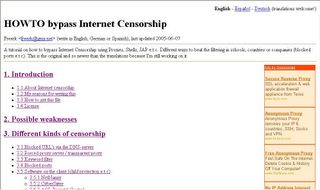 As far as I remember, the majority of professional website users apparently hate to see free content being compared with advertisement banners. But in the end, we all have to pay the bills, and a little income from selling ads even on one’s blog can be worth every buck. Sadly, the MikeSchnoor.com doesn’t produce a profit worth to mention. Hardly noone ever clicks the Google Adsense links which are visible below each entry or on the category and main websites, and on the sidebar. But for testing purposes, I’m on the run with them.
As far as I remember, the majority of professional website users apparently hate to see free content being compared with advertisement banners. But in the end, we all have to pay the bills, and a little income from selling ads even on one’s blog can be worth every buck. Sadly, the MikeSchnoor.com doesn’t produce a profit worth to mention. Hardly noone ever clicks the Google Adsense links which are visible below each entry or on the category and main websites, and on the sidebar. But for testing purposes, I’m on the run with them.
However, Markus Klöschen explained in his recent article why he chooses to click ads. As a website owner, one may not violate against Google’s Policy of Adsense by clicking your own ads, but we can choose to click other people’s ads whenever we like it.
I’m bannerblind. I will in no case click on any colorfull, animated or blinking banner. Since I do visit pages which are using advertisements like that, I pimped my firefox and installed an ad-blocker. This works very good. But I don’t see the ads on my page any more, so I don’t see what some of my visitors see. Therefore I removed the adsense-expression from my adblocker to get the adsense again. From that time on I do see the adsense links and what shall I say, they are relevant.
Relevant… yes, I saw various ads coming from the Google Server and I felt obliged to click and read the advertiser’s website. I found a few things on Business Ethics and some other nice gadgets, added the URLs to the bookmarks and had a good day. One can argument that this does not help the advertiser and is just another cost factor if people click their own Google Ads or are motivated to click ads, but if it’s relevant? I don’t click „Sexy Voice Chat“ ads, but rather those that keep my curiousity engaged, those that keep me interested. If ads are being relevant for me, I will click them on other people’s blogs. That’s what I see as some sort of honorable mission in order to say „Thank you for all your free content.“
Update: Edited due to Markus‘ comment – that’s one for the morning and the lack of caffine. ;)
[via Light Within]

 This morning I read a nice post by Google Blogoscoped:
This morning I read a nice post by Google Blogoscoped:  Perhaps there’s time to push yourself above the limit of reading blogs in these days. First, Duncan pulled the
Perhaps there’s time to push yourself above the limit of reading blogs in these days. First, Duncan pulled the 

